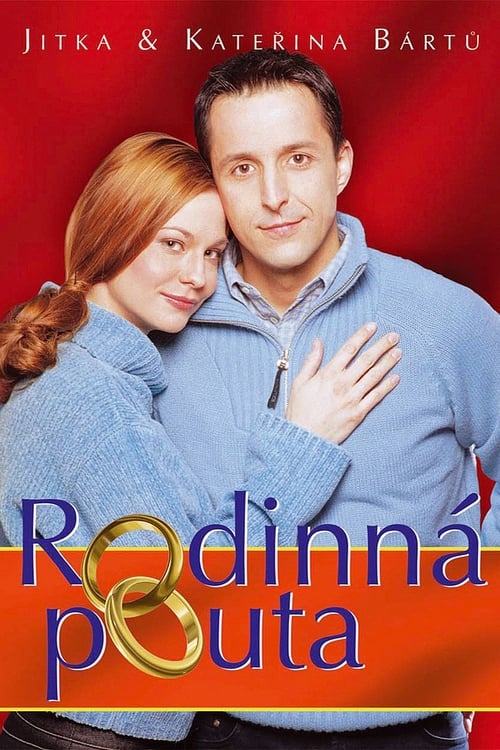
Ask Your Own Question
What is the plot?
"Rodinná pouta" begins with the introduction of the main family, the Šebestová family, who are dealing with various personal and interpersonal issues. The matriarch, Marie, is a strong-willed woman who tries to keep her family together despite their individual struggles. Her husband, Pavel, is a more passive character, often caught in the crossfire of family conflicts.
The story unfolds with Marie's daughter, Tereza, who is in a tumultuous relationship with her boyfriend, Michal. Tereza is torn between her love for Michal and her mother's disapproval of him. This tension escalates when Tereza discovers that Michal has been unfaithful, leading to a dramatic confrontation between mother and daughter about love, loyalty, and the consequences of their choices.
Meanwhile, Marie's son, Jakub, is facing his own challenges. He is a struggling artist who feels the pressure of his family's expectations. His relationship with his girlfriend, Klára, becomes strained as he grapples with his insecurities and the fear of not living up to his potential. Klára, feeling neglected, begins to question their future together, which adds to Jakub's emotional turmoil.
As the series progresses, the family faces a crisis when Pavel is diagnosed with a serious illness. This news brings the family together, but it also exposes underlying tensions. Marie becomes increasingly protective and anxious, while the children react differently; Tereza tries to be strong for her father, while Jakub withdraws into his art, using it as an escape from the harsh reality of their situation.
In a pivotal moment, Tereza decides to confront Michal about his infidelity. She demands answers and ultimately chooses to end their relationship, realizing that her self-worth is more important than staying with someone who does not respect her. This decision marks a turning point for Tereza, as she begins to assert her independence and prioritize her own happiness.
Jakub, inspired by his father's fight against illness, decides to take a leap of faith and pursue his art more seriously. He enters a local art competition, hoping to gain recognition and prove to himself and his family that he can succeed. His journey is fraught with self-doubt, but he finds support in Klára, who encourages him to embrace his talent.
As the family navigates these challenges, they also face external pressures from their community and friends. Marie's attempts to maintain a facade of normalcy lead to conflicts with her neighbors, who gossip about the family's struggles. This adds to her stress, and she begins to feel isolated in her role as the family leader.
The climax of the series occurs when Pavel's health deteriorates, leading to a critical moment where the family must come together to support him. They have a heartfelt discussion about their fears and hopes, which brings them closer. This moment of vulnerability allows each family member to express their love and appreciation for one another, despite their previous conflicts.
In the final episodes, the family begins to heal. Tereza finds a new sense of purpose in her life, focusing on her career and personal growth. Jakub wins the art competition, which boosts his confidence and strengthens his relationship with Klára. Marie learns to let go of some of her control, allowing her children to make their own choices.
The series concludes with a poignant scene where the family gathers for a meal, symbolizing their unity and resilience. They reflect on their journey, acknowledging the struggles they faced but also celebrating their growth and the bonds that hold them together. The final moments emphasize the importance of family, love, and the ability to overcome adversity together.
What is the ending?
In the ending of "Rodinná pouta," the various character arcs reach their conclusions as they confront their pasts and make choices about their futures. The family dynamics are tested, leading to reconciliations and new beginnings. Key characters find closure in their relationships, while others face the consequences of their actions.
As the final episodes unfold, the tension between the characters escalates. The family gathers for a significant event, where long-standing grievances surface. Emotions run high as secrets are revealed, leading to confrontations that force the characters to confront their true feelings.
In a pivotal scene, the matriarch of the family, who has been a stabilizing force, reflects on her life choices and the impact they have had on her children. Her vulnerability opens the door for her children to express their own struggles, leading to a cathartic moment of understanding and forgiveness.
Meanwhile, one of the siblings, who has been grappling with personal demons, makes a life-altering decision that signifies a turning point in their journey. This choice not only affects their own future but also ripples through the family, prompting others to reevaluate their paths.
As the series concludes, the characters are shown in a montage that highlights their growth. Some are seen embarking on new adventures, while others find solace in their relationships. The final scenes emphasize the importance of family bonds, resilience, and the possibility of redemption.
The fate of each main character is revealed: the matriarch finds peace in her role as a mother and grandmother, one sibling embraces a new career path, while another reconciles with their past mistakes. The series ends on a hopeful note, suggesting that despite the challenges they faced, the family is stronger together.
In the final episodes of "Rodinná pouta," the narrative builds towards a climactic family gathering that serves as a backdrop for the resolution of various character arcs.
Scene 1: The family prepares for a significant celebration, perhaps a birthday or anniversary, which brings everyone together. The atmosphere is charged with anticipation, but underlying tensions are palpable. The matriarch, who has always been the glue holding the family together, busies herself with preparations, her face a mask of determination, yet her eyes betray a hint of worry about the unresolved issues among her children.
Scene 2: As the guests arrive, the initial warmth of the gathering quickly gives way to awkwardness. Conversations are stilted, and the siblings exchange glances filled with unspoken words. The camera captures the subtle shifts in their expressions, revealing the emotional weight they carry. One sibling, visibly anxious, clutches a drink, their internal struggle evident as they contemplate confronting their past.
Scene 3: During the celebration, a toast is proposed, and the matriarch stands to speak. Her voice trembles slightly as she reflects on the family's journey, sharing heartfelt anecdotes that evoke both laughter and tears. This moment serves as a catalyst, prompting the siblings to open up about their own experiences. The tension in the room begins to dissipate as they share their struggles, revealing vulnerabilities that had long been hidden.
Scene 4: A confrontation erupts when one sibling, fueled by frustration, accuses another of selfishness and neglect. The argument escalates, voices raised, and emotions boiling over. The matriarch intervenes, her voice firm yet compassionate, urging them to remember their love for one another. This moment of intervention is crucial, as it forces the siblings to confront not only their grievances but also their deep-seated love and loyalty.
Scene 5: Following the confrontation, a quieter moment unfolds. One sibling, feeling the weight of their choices, steps outside for air. They are joined by another sibling, and in this intimate setting, they share a heartfelt conversation. The sibling reveals their struggles with addiction and the impact it has had on their relationships. This moment of honesty leads to a powerful reconciliation, as they embrace, tears streaming down their faces, symbolizing forgiveness and understanding.
Scene 6: As the celebration winds down, the family gathers for a final toast. The matriarch raises her glass, her voice steady as she speaks of hope and new beginnings. The camera pans across the faces of the family members, capturing their expressions of determination and love. Each character reflects on their journey, and the montage shows glimpses of their futures: one sibling pursuing a new career, another starting a family, and the matriarch finding joy in her grandchildren.
Scene 7: The series concludes with a poignant image of the family together, united in their shared experiences. The final shot lingers on the matriarch, her face illuminated by the warm glow of the setting sun, symbolizing the enduring strength of family bonds. The screen fades to black, leaving the audience with a sense of hope and the understanding that, despite the challenges they faced, the family has emerged stronger and more connected than ever.
Is there a post-credit scene?
"Rodinná pouta," the Czech television series that aired in 2004, does not feature a post-credit scene. The show focuses on the intricate relationships and emotional struggles of the characters, primarily revolving around the family dynamics and personal conflicts. Each episode concludes with a resolution to the plotlines presented, but there are no additional scenes or content after the credits that expand on the story or characters. The narrative is designed to wrap up within the episode itself, leaving viewers with a sense of closure.
What are the main conflicts between the characters in Rodinná pouta?
The main conflicts in Rodinná pouta revolve around family dynamics, secrets, and betrayals. For instance, the relationship between the siblings, particularly between the ambitious and often ruthless character of Jitka and her more compassionate brother, creates tension. Jitka's desire for power and control often clashes with her brother's moral compass, leading to emotional confrontations that reveal deeper family issues.
How does the character of Jitka evolve throughout the series?
Jitka starts as a fiercely ambitious woman, willing to manipulate those around her to achieve her goals. As the series progresses, her character is tested by various personal losses and moral dilemmas. These experiences lead her to confront her own vulnerabilities and the consequences of her actions, ultimately resulting in a more complex and conflicted character who struggles with her choices.
What role does the family business play in the relationships among the characters?
The family business serves as a central plot device that intertwines the characters' lives and ambitions. It creates a backdrop for rivalry, loyalty, and betrayal. Characters like Jitka and her brother often find themselves at odds over the direction of the business, which reflects their personal values and ambitions. The stakes of the business decisions often escalate tensions, leading to dramatic confrontations and revelations.
How does the character of Pavel impact the family dynamics?
Pavel, as a central figure in the family, embodies the struggle between tradition and modernity. His decisions often influence the family's cohesion, as he tries to mediate conflicts while also pursuing his own interests. His relationships with other family members, particularly with Jitka and their parents, reveal the complexities of loyalty and expectation, often leading to emotional turmoil and pivotal plot developments.
What secrets are revealed about the family throughout the series?
Throughout Rodinná pouta, several secrets come to light that significantly impact the family dynamics. These include hidden past relationships, financial misdeeds, and betrayals that shake the foundation of trust among family members. For example, revelations about Jitka's past decisions and their repercussions create rifts and force characters to confront uncomfortable truths about themselves and each other.
Is this family friendly?
"Rodinná pouta," produced in 2004, is a Czech television series that delves into the complexities of family relationships, love, and personal struggles. While the show does explore various themes, it may not be entirely family-friendly for younger viewers or sensitive individuals due to several potentially objectionable or upsetting aspects:
-
Family Conflicts: The series often portrays intense family disputes, which can be emotionally charged and may be distressing for children or sensitive viewers.
-
Romantic Relationships: There are scenes that depict romantic entanglements, including infidelity and heartbreak, which may be inappropriate for younger audiences.
-
Health Issues: The show addresses serious health problems affecting characters, which can evoke strong emotional responses and may be upsetting for some viewers.
-
Loss and Grief: Themes of loss, including the death of loved ones, are present in the narrative, potentially leading to emotional discomfort.
-
Social Issues: The series touches on various social issues, including financial struggles and personal crises, which may be heavy for younger viewers to process.
-
Emotional Turmoil: Characters often experience significant emotional distress, including depression and anxiety, which may resonate deeply and be challenging for sensitive individuals.
Overall, while "Rodinná pouta" offers rich storytelling and character development, its themes and emotional depth may not be suitable for all audiences, particularly children or those who are sensitive to such topics.














